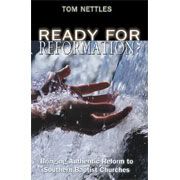It was 488 years ago that Martin Luther nailed his 95 theses to the door of the Wittenberg Church. This event signifies the beginning of the Protestant Reformation. It also reminds us that reformation is indeed possible. In our day when this same kind of movement of God is desperately needed again, the lessons learned from history can encourage and guide us.
Tom Nettles’ new book can help us at just this point. Before continuing on with my own comments on his book, let me recommend 2 reviews that have recently appeared.
Scott Lamb has a good review of Nettles’ book as does one of Nettles’ students at the provocations and pantings blog. Scott has also included a picture of Reformation Wall. See if you can notice anything different about it!
In his call for a reformation in contemporary preaching, Dr. Nettles describes the sermon of a modern “strategically influential pastor” who claimed to have received “fresh fire from the altar.” Nettles evaluates the man’s sermon:
How many of God’s sheep have been led to endure this kind of pompous imposition! He never read the text to the congregation, for it was not apparent that its content was germane to his sermon. All of his points supposedly flew straight from the altar from which were drawn the coals that cleansed Isaiah’s lips. Oh, that such had been the case, for then the entire sermon would probably never have assaulted a Christian pulpit. Each succeeding assertion came as a result of an immediate perception of what God wanted him to say to that particular congregation … (p. 35).
With tongue firmly planted in cheek, Nettles notes that “some of his ideas rescued his hearers from mistakes they might have derived from Scripture.” He concludes this third chapter with a succinct warning and call. “Without a recovery of confidence in the transforming power of proclaimed truth, the reformation will fail, and the Baptist advance for truth and the divine glory will stagnate and corrupt.” Instead, through self-criticism and examination preachers must give themselves to preaching “Christ and him crucified” and to resolve “not to handle the Word of God deceitfully” (p. 38).
The next two chapters are entitled, “Baptists must recover the work of evangelism” (parts 1 and 2).


























